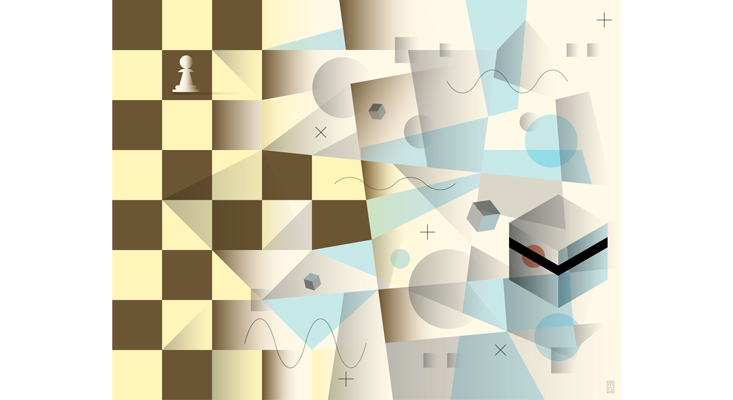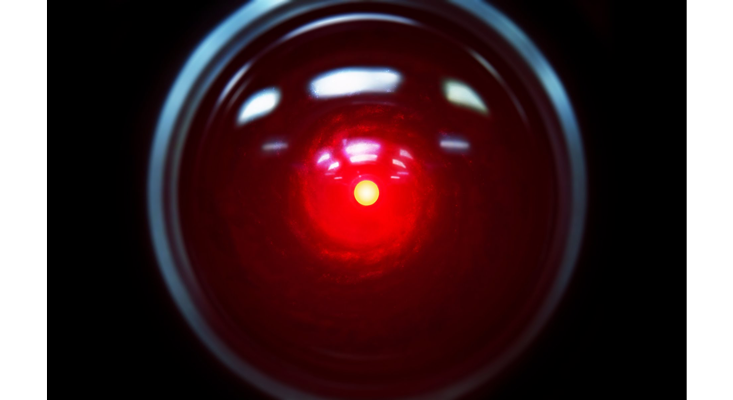Humans are probably not the greatest intelligences in the universe. Earth is a relatively young planet and the oldest civilizations could be billions of years older than us. But even on Earth, Homo sapiens may not be the most intelligent species for that much longer.
The world Go, chess, and Jeopardy champions are now all AIs. AI is projected to outmode many human professions within the next few decades. And given the rapid pace of its development, AI may soon advance to artificial general intelligence—intelligence that, like human intelligence, can combine insights from different topic areas and display flexibility and common sense. From there it is a short leap to superintelligent AI, which is smarter than humans in every respect, even those that now seem firmly in the human domain, such as scientific reasoning and social skills. Each of us alive today may be one of the last rungs on the evolutionary ladder that leads from the first living cell to synthetic intelligence.
What we are only beginning to realize is that these two forms of superhuman intelligence—alien and artificial—may not be so distinct. The technological developments we are witnessing today may have all happened before, elsewhere in the universe. The transition from biological to synthetic intelligence may be a general pattern, instantiated over and over, throughout the cosmos. The universe’s greatest intelligences may be postbiological, having grown out of civilizations that were once biological. (This is a view I share with Paul Davies, Steven Dick, Martin Rees, and Seth Shostak, among others.) To judge from the human experience—the only example we have—the transition from biological to postbiological may take only a few hundred years.

I prefer the term “postbiological” to “artificial” because the contrast between biological and synthetic is not very sharp. Consider a biological mind that achieves superintelligence through purely biological enhancements, such as nanotechnologically enhanced neural minicolumns. This creature would be postbiological, although perhaps many wouldn’t call it an “AI.” Or consider a computronium that is built out of purely biological materials, like the Cylon Raider in the reimagined Battlestar Galactica TV series.
The key point is that there is no reason to expect humans to be the highest form of intelligence there is. Our brains evolved for specific environments and are greatly constrained by chemistry and historical contingencies. But technology has opened up a vast design space, offering new materials and modes of operation, as well as new ways to explore that space at a rate much faster than traditional biological evolution. And I think we already see reasons why synthetic intelligence will outperform us.
An extraterrestrial AI could have goals that conflict with those of biological life.
Silicon microchips already seem to be a better medium for information processing than groups of neurons. Neurons reach a peak speed of about 200 hertz, compared to gigahertz for the transistors in current microprocessors. Although the human brain is still far more intelligent than a computer, machines have almost unlimited room for improvement. It may not be long before they can be engineered to match or even exceed the intelligence of the human brain through reverse-engineering the brain and improving upon its algorithms, or through some combination of reverse engineering and judicious algorithms that aren’t based on the workings of the human brain.
In addition, an AI can be downloaded to multiple locations at once, is easily backed up and modified, and can survive under conditions that biological life has trouble with, including interstellar travel. Our measly brains are limited by cranial volume and metabolism; superintelligent AI, in stark contrast, could extend its reach across the Internet and even set up a Galaxy-wide computronium, utilizing all the matter within our galaxy to maximize computations. There is simply no contest. Superintelligent AI would be far more durable than us.
Suppose I am right. Suppose that intelligent life out there is postbiological. What should we make of this? Here, current debates over AI on Earth are telling. Two of the main points of contention—the so-called control problem and the nature of subjective experience—affect our understanding of what other alien civilizations may be like, and what they may do to us when we finally meet.
Ray Kurzweil takes an optimistic view of the postbiological phase of evolution, suggesting that humanity will merge with machines, reaching a magnificent technotopia. But Stephen Hawking, Bill Gates, Elon Musk, and others have expressed the concern that humans could lose control of superintelligent AI, as it can rewrite its own programming and outthink any control measures that we build in. This has been called the “control problem”—the problem of how we can control an AI that is both inscrutable and vastly intellectually superior to us.
Superintelligent AI could be developed during a technological singularity, an abrupt transition when ever-more-rapid technological advances—especially an intelligence explosion—slip beyond our ability to predict or understand. But even if such an intelligence arises in less dramatic fashion, there may be no way for us to predict or control its goals. Even if we could decide on what moral principles to build into our machines, moral programming is difficult to specify in a foolproof way, and such programming could be rewritten by a superintelligence in any case. A clever machine could bypass safeguards, such as kill switches, and could potentially pose an existential threat to biological life. Millions of dollars are pouring into organizations devoted to AI safety. Some of the finest minds in computer science are working on this problem. They will hopefully create safe systems, but many worry that the control problem is insurmountable.
In light of this, contact with an alien intelligence may be even more dangerous than we think. Biological aliens might well be hostile, but an extraterrestrial AI could pose an even greater risk. It may have goals that conflict with those of biological life, have at its disposal vastly superior intellectual abilities, and be far more durable than biological life.
That argues for caution with so-called Active SETI, in which we do not just passively listen for signals from other civilizations, but deliberately advertise our presence. In the most famous example, in 1974 Frank Drake and Carl Sagan used the giant dish-telescope in Arecibo, Puerto Rico, to send a message to a star cluster. Advocates of Active SETI hold that, instead of just passively listening for signs of extraterrestrial intelligence, we should be using our most powerful radio transmitters, such as Arecibo, to send messages in the direction of the stars that are nearest to Earth.
Such a program strikes me as reckless when one considers the control problem. Although a truly advanced civilization would likely have no interest in us, even one hostile civilization among millions could be catastrophic. Until we have reached the point at which we can be confident that superintelligent AI does not pose a threat to us, we should not call attention to ourselves. Advocates of Active SETI point out that our radar and radio signals are already detectable, but these signals are fairly weak and quickly blend with natural galactic noise. We would be playing with fire if we transmitted stronger signals that were intended to be heard.
Why would nonconscious machines have the same value we place on biological intelligence?
The safest mindset is intellectual humility. Indeed, barring blaringly obvious scenarios in which alien ships hover over Earth, as in the film Arrival, I wonder if we could even recognize the technological markers of a truly advanced superintelligence. Some scientists project that superintelligent AIs could feed off black holes or create Dyson Spheres, megastructures that harnesses the energy of entire stars. But these are just speculations from the vantage point of our current technology; it’s simply the height of hubris to claim that we can foresee the computational abilities and energy needs of a civilization millions or even billions of years ahead of our own.
Some of the first superintelligent AIs could have cognitive systems that are roughly modeled after biological brains—the way, for instance, that deep learning systems are roughly modeled on the brain’s neural networks. Their computational structure might be comprehensible to us, at least in rough outlines. They may even retain goals that biological beings have, such as reproduction and survival.
But superintelligent AIs, being self-improving, could quickly morph into an unrecognizable form. Perhaps some will opt to retain cognitive features that are similar to those of the species they were originally modeled after, placing a design ceiling on their own cognitive architecture. Who knows? But without a ceiling, an alien superintelligence could quickly outpace our ability to make sense of its actions, or even look for it. Perhaps it would even blend in with natural features of the universe; perhaps it is in dark matter itself, as Caleb Scharf speculated.

An advocate of Active SETI will point out that this is precisely why we should send signals into space—let them find us, and let them design means of contact they judge to be tangible to an intellectually inferior species like us. While I agree this is a reason to consider Active SETI, the possibility of encountering a dangerous superintelligence outweighs it. For all we know, malicious superintelligences could infect planetary AI systems with viruses, and wise civilizations build cloaking devices. We humans may need to reach our own singularity before embarking upon Active SETI. Our own superintelligent AIs will be able to inform us of the prospects for galactic AI safety and how we would go about recognizing signs of superintelligence elsewhere in the universe. It takes one to know one.
It is natural to wonder whether all this means that humans should avoid developing sophisticated AI for space exploration; after all, recall the iconic HAL in 2001: A Space Odyssey. Considering a future ban on AI in space would be premature, I believe. By the time humanity is able to investigate the universe with its own AIs, we humans will likely have reached a tipping point. We will have either already lost control of AI—in which case space projects initiated by humans will not even happen—or achieved a firmer grip on AI safety. Time will tell.
Raw intelligence is not the only issue to worry about. Normally, we expect that if we encountered advanced alien intelligence, we would likely encounter creatures with very different biologies, but they would still have minds like ours in an important sense—there would be something it is like, from the inside, to be them. Consider that every moment of your waking life, and whenever you are dreaming, it feels like something to be you. When you see the warm hues of a sunrise, or smell the aroma of freshly baked bread, you are having conscious experience. Likewise, there is also something that it is like to be an alien—or so we commonly assume. That assumption needs to be questioned though. Would superintelligent AIs even have conscious experience and, if they did, could we tell? And how would their inner lives, or lack thereof, impact us?
The question of whether AIs have an inner life is key to how we value their existence. Consciousness is the philosophical cornerstone of our moral systems, being key to our judgment of whether someone or something is a self or person rather than a mere automaton. And conversely, whether they are conscious may also be key to how they value us. The value an AI places on us may well hinge on whether it has an inner life; using its own subjective experience as a springboard, it could recognize in us the capacity for conscious experience. After all, to the extent we value the lives of other species, we value them because we feel an affinity of consciousness—thus most of us recoil from killing a chimp, but not from munching on an apple.
But how can beings with vast intellectual differences and that are made of different substrates recognize consciousness in each other? Philosophers on Earth have pondered whether consciousness is limited to biological phenomena. Superintelligent AI, should it ever wax philosophical, could similarly pose a “problem of biological consciousness” about us, asking whether we have the right stuff for experience.
Who knows what intellectual path a superintelligence would take to tell whether we are conscious. But for our part, how can we humans tell whether an AI is conscious? Unfortunately, this will be difficult. Right now, you can tell you are having experience, as it feels like something to be you. You are your own paradigm case of conscious experience. And you believe that other people and certain nonhuman animals are likely conscious, for they are neurophysiologically similar to you. But how are you supposed to tell whether something made of a different substrate can have experience?
Consider, for instance, a silicon-based superintelligence. Although both silicon microchips and neural minicolumns process information, for all we now know they could differ molecularly in ways that impact consciousness. After all, we suspect that carbon is chemically more suitable to complex life than silicon is. If the chemical differences between silicon and carbon impact something as important as life itself, we should not rule out the possibility that the chemical differences also impact other key functions, such as whether silicon gives rise to consciousness.
The conditions required for consciousness are actively debated by AI researchers, neuroscientists, and philosophers of mind. Resolving them might require an empirical approach that is informed by philosophy—a means of determining, on a case-by-case basis, whether an information-processing system supports consciousness, and under what conditions.
Here’s a suggestion, a way we can at least enhance our understanding of whether silicon supports consciousness. Silicon-based brain chips are already under development as a treatment for various memory-related conditions, such as Alzheimer’s and post-traumatic stress disorder. If, at some point, chips are used in areas of the brain responsible for conscious functions, such as attention and working memory, we could begin to understand whether silicon is a substrate for consciousness. We might find that replacing a brain region with a chip causes a loss of certain experience, like the episodes that Oliver Sacks wrote about. Chip engineers could then try a different, non-neural, substrate, but they may eventually find that the only “chip” that works is one that is engineered from biological neurons. This procedure would serve as a means of determining whether artificial systems can be conscious, at least when they are placed in a larger system that we already believe is conscious.
Even if silicon can give rise to consciousness, it might do so only in very specific circumstances; the properties that give rise to sophisticated information processing (and which AI developers care about) may not be the same properties that yield consciousness. Consciousness may require consciousness engineering—a deliberate engineering effort to put consciousness in machines.
Here’s my worry. Who, on Earth or on distant planets, would aim to engineer consciousness into AI systems themselves? Indeed, when I think of existing AI programs on Earth, I can see certain reasons why AI engineers might actively avoid creating conscious machines.
Robots are currently being designed to take care of the elderly in Japan, clean up nuclear reactors, and fight our wars. Naturally, the question has arisen: Is it ethical to use robots for such tasks if they turn out to be conscious? How would that differ from breeding humans for these tasks? If I were an AI director at Google or Facebook, thinking of future projects, I wouldn’t want the ethical muddle of inadvertently designing a sentient system. Developing a system that turns out to be sentient could lead to accusations of robot slavery and other public-relations nightmares, and it could even lead to a ban on the use of AI technology in the very areas the AI was designed to be used in. A natural response to this is to seek architectures and substrates in which robots are not conscious.
Further, it may be more efficient for a self-improving superintelligence to eliminate consciousness. Think about how consciousness works in the human case. Only a small percentage of human mental processing is accessible to the conscious mind. Consciousness is correlated with novel learning tasks that require attention and focus. A superintelligence would possess expert-level knowledge in every domain, with rapid-fire computations ranging over vast databases that could include the entire Internet and ultimately encompass an entire galaxy. What would be novel to it? What would require slow, deliberative focus? Wouldn’t it have mastered everything already? Like an experienced driver on a familiar road, it could rely on nonconscious processing. The simple consideration of efficiency suggests, depressingly, that the most intelligent systems will not be conscious. On cosmological scales, consciousness may be a blip, a momentary flowering of experience before the universe reverts to mindlessness.
If people suspect that AI isn’t conscious, they will likely view the suggestion that intelligence tends to become postbiological with dismay. And it heightens our existential worries. Why would nonconscious machines have the same value we place on biological intelligence, which is conscious?
Soon, humans will no longer be the measure of intelligence on Earth. And perhaps already, elsewhere in the cosmos, superintelligent AI, not biological life, has reached the highest intellectual plateaus. But perhaps biological life is distinctive in another significant respect—conscious experience. For all we know, sentient AI will require a deliberate engineering effort by a benevolent species, seeking to create machines that feel. Perhaps a benevolent species will see fit to create their own AI mindchildren. Or perhaps future humans will engage in some consciousness engineering, and send sentience to the stars.
Susan Schneider is the author of Artificial You: AI and the Future of Your Mind. She is the NASA-Baruch Blumberg Chair at the Library of Congress and the director of the AI, Mind and Society Group at the University of Connecticut. Her work has been explored on PBS, The History Channel, the National Geographic Channel, and featured by The New York Times, Science, and Smithsonian.
This article was originally published on Nautilus Cosmos in December 2016.






























